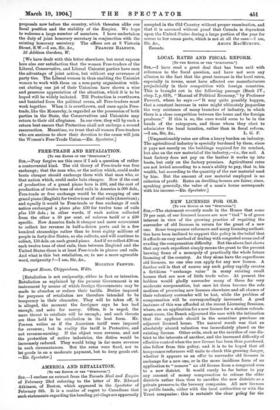LOCAL RATES AND FISCAL REFORM.
[TO TRH EDITOR OF VIZ "SPRCTATOR.1
SIE,-I have read a great deal that has been said with reference to the fiscal question, and have not seen any allusion to the fact that the great increase in the local rates, especially in towns, must have affected our manufacturers prejudicially in their competition with foreign countries. This is brought out in the following passage (Book IV., chap. 7, p. 619), "Manual of Political Economy," by Professor Fawcett, where he says :—" It may quite possibly happen, that a constant increase in rates might ultimately jeopardise the very existence of many branches of industry, in which there is a close competition between the home and the foreign producer." If this is so, the cure would seem to be in the hands of the ratepayers, and those whom they elect to administer the local taxation, rather than in fiscal reform.
[Unquestionably rates are often a heavy burden on industry. The agricultural industry is specially burdened by them, since it pays not merely on the buildings required for its conduct, but also on the raw material of the industry,—i.e., the soil. A boot factory does not pay on the leather it works up into boots, but only on the factory premises. Agricultural rates are not levied according to a man's ability to pay, that is, his wealth, but according to the quantity of the raw material used by him. But the amount of raw material employed is no criterion of profit. Rates on dwelling-houses are fairer, since, speaking generally, the value of a man's house corresponds with his income.—ED. Spectator.]










































 Previous page
Previous page